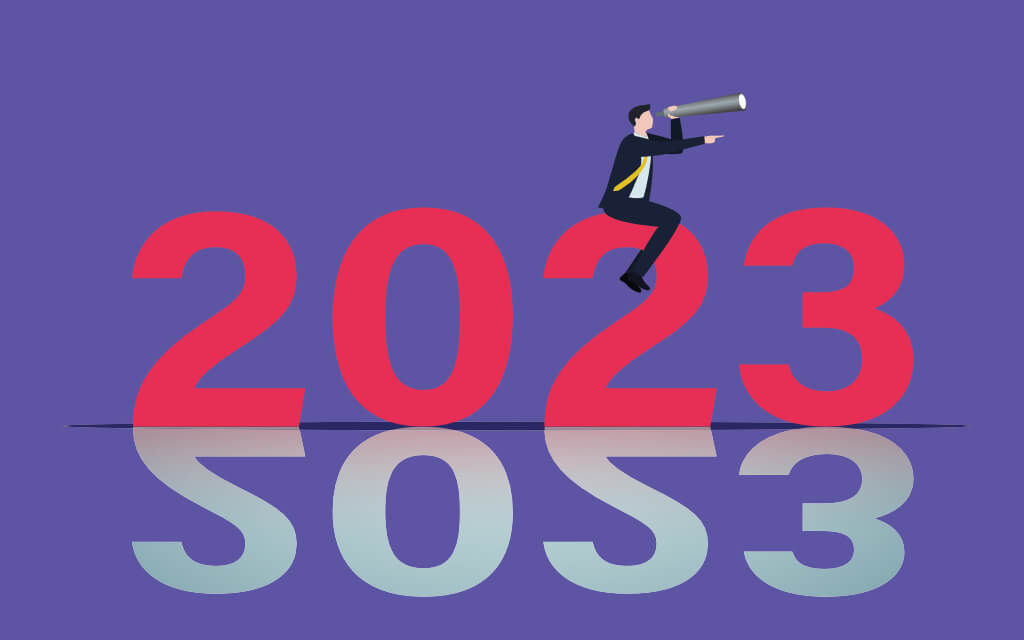As ever, the end of January marks a relief for accountants across the UK: a time to rest, relax, take some time away from work and recover from the stresses of self-assessment season.
But once you’ve caught up on sleep and booked your next holiday, it’s also time to look ahead at the year to come, and what might lie in store for your practice and the challenges facing the accounting profession in 2023.
Of course, many of 2022’s main challenges are far from over. And if the past few years have taught us anything, it’s to expect the unexpected and be ready to respond to sudden change – whether that’s global crisis or political turbulence.
We do expect a few key themes to affect the profession this year, however.
Economic crisis
Dominating the headlines and at the forefront of most people’s minds is the looming economic challenge facing the UK this year.
The ONS is soon to announce its GDP estimates for the fourth quarter of 2022, which will reveal whether or not the country is officially in recession. The International Monetary Fund expects the UK to be the only major economy to shrink in 2023, predicting a contraction of 0.6%.
Even if a technical recession isn’t confirmed, the outlook remains bleak for both businesses and individuals. Inflation still stands at a record high, while insolvencies were 32% higher year-on-year in December 2022, and 76% higher than before the pandemic in 2019.
As costs continue to rise and pressure mounts on businesses, your clients will need smooth and accurate financial support, as well as advice on the broader aspects of running their business.
Many accountants are increasingly focused on this aspect of their service: the value they give to their clients through communication and sharing of expertise.
Of course, your accountancy firm is a business too, and will also be feeling the pressure. This year, many practices will be keeping a close eye on their finances and looking to create efficiencies wherever possible.
Top tip
If you offer business advice but aren’t sure how to get the word out to your clients, focusing on thought-leadership content might help. Use blog posts, social media or events like webinars to share your unique perspective and expertise.
This is a chance to offer more nuance than a straightforward informational piece, and spark some ideas among your clients about the type of advice they might need.
Digital transformation beyond MTD
Making Tax Digital for income tax self-assessment (MTD for ITSA) might be delayed until 2026, but the need for accountants to digitise and streamline their operations is still pressing – again, as a way to reduce costs in the face of economic challenges.
The next couple of years could be a good time to reassess your digital setup and think about how you can make things more efficient, rather than having to rush to the quickest solution to keep your clients compliant with MTD.
If you haven’t been completely satisfied with your software to date, or you’ve noticed a gap in your tech stack, this year could be the time to find a solution that covers all your services, rather than just automating income tax.
This year, we can expect more change in the accounting tech industry, which has been rapidly consolidating in the last year.
We’ll also see more conversations, and potentially more breakthroughs, on the use of cutting-edge technologies like generative AI – which sparked much interest and debate at the end of 2022 with the landmark launch of ChatGPT.
As the power and potential of AI becomes increasingly visible, accountants should think about the part this kind of tech could play in their work, as well as the risks it poses.
Top tip
As well as using technology to improve your service, think about the different ways you can use digital tools to communicate effectively with your clients.
Last year, our research report into digital accountants found that a third of SMEs had found their accountants online. We also found a generational shift in the way clients wanted their accountant to communicate with them, with younger SME owners more likely than older generations to prefer communication via text.
ESG regulation gathers momentum
Concerns around environmental, social and governance (ESG) issues are nothing new, but with each year that passes, they’re becoming more urgent for businesses to take action on.
In October 2022, the ONS reported that 74% of adults in the UK feel worried about climate change, and 75% had made lifestyle changes to help tackle it.
Globally, new accounting regulations are developing to standardise the way businesses report on their sustainability credentials. A new set of European sustainability reporting standards (ESRS), for instance, are expected around the middle of this year – while a corporate sustainability reporting directive will make it mandatory for certain companies to report in line with those standards.
To start with, compulsory reporting will only apply to relatively small sections of the business population (the corporate sustainability reporting directive affects about 50,000 companies in total), but it’s only a matter of time before similar policies extend their reach.
Top tip
It might be some time before your clients are directly impacted by these regulations, but many of them will find themselves facing increasing pressure from customers and stakeholders to demonstrate their ESG performance.
Make sure you’re up to date on the latest statutory requirements, and communicate with your clients about what they can do in response. There are some key themes in ethical business from the last few years that you could follow as part of your content strategy for 2023.
Skills shortage
Recruitment was a major challenge for accountants at the end of 2022, and it continues to be a priority.
While the post-Covid ‘great resignation’ might have something to do with this, it’s also a result of longer-term trends, technological developments, and the public image of the profession.
Some practices are rethinking how and who they recruit. For some, traditional accountancy training is being replaced by IT expertise, wider business knowledge or customer service skills. Others are looking at filling their skills gap in different ways, advertising employed or subcontractor jobs, as well as full and part-time positions.
To appeal to potential recruits and stand out to the most talented jobseekers, accountants need to make sure their culture and working practices align with modern expectations of workplaces.
Gone are the days of a default 9-5 in the office – with online accounting and communication tools readily available, running a remote or hybrid business is much more commonplace than it once was.
That also means some of the more traditional attitudes to when and how people work are shifting, as practices reconsider the styles of working the profession has often taken for granted.
Top tip
Maybe you already have a great company culture, but you just need to get the word out. To do this, think about your brand as an employer, not just as a service provider – how do your firm’s core values filter through to day-to-day life as an employee?
Adding or updating a careers page on your website, for example, can help you to communicate what you offer and show off some of the reasons people should work for you, from charity partnerships to flexible working.
Get in touch
Do these challenges ring true for you, or is there something else on the horizon you’re getting ready to tackle?
Whatever the next hurdle is, we’re interested to hear about it – and to help your firm reach its goals with an effective digital marketing strategy.
Talk to us about your digital marketing ambitions for 2023, and find out how we can help.



